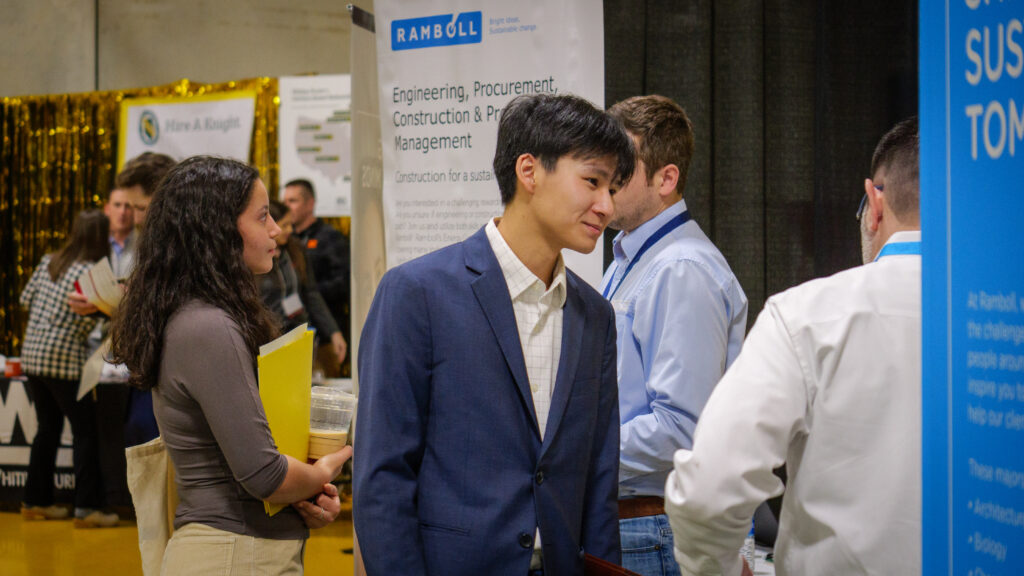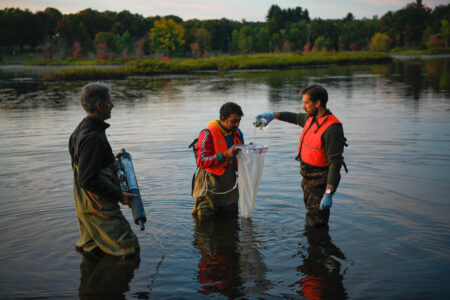Increasingly, society is embracing the idea that classroom education alone is not sufficient to prepare students for the demands of the workforce. Practical experience must complement formal instruction, as both have become essential components of a comprehensive approach to education. This is especially true for students in STEM (science, technology, engineering, and mathematics) and business fields, where understanding theoretical concepts is crucial. However, the ability to apply these concepts in real-world scenarios is what really sets successful early-career professionals apart.
At Clarkson University, for example, all undergraduates must complete a professional experience. Today’s professional experience is not the Hollywood stereotype of an internship, where a student gets coffee or does busy work. Clarkson students gain professional experience through paid internships, semester-long co-ops, participation in laboratory research, and on competition teams.
Clarkson University helps students participate in internships and co-ops to gain hands-on experience in their field. For example, engineering students might work with organizations like General Electric or the Los Alamos National Laboratory, where they apply their knowledge of thermodynamics, material science, and systems engineering to actual projects. This not only reinforces their classroom learning but introduces them to the complexities and challenges of working in a professional environment.
“When I was choosing a college, it really stood out to me how Clarkson students have so many professional experiences,” remembers Jack DiMeo, who took part in internships, undergraduate research and SPEED teams before graduating in 2023. “It’s super important to have at least some combination of these experiences while in college in order to set yourself up for professional success in the future.”

Mechanical and Aeronautical Engineering graduate Jack DiMeo went on to earn the Department of Defense SMART Scholarship and interned with the AV-8 Harrier programme. After graduation, he went to a position with the Department of Defense. Source: Clarkson University
Building professional networks
In internships, students work part-time while studying, and in co-ops, students work full-time during a semester away from campus. Both experiences offer students the opportunity to build professional networks. Students connect with professionals in their field, gain mentors, and establish relationships that can be invaluable when seeking full-time employment after graduation.
Clarkson University’s strong connections with industry partners across various sectors give its students a distinct advantage in this regard. The University’s Career Centre works closely with companies to ensure students can access various internship and co-op opportunities. These connections often lead to job offers, with many Clarkson students securing employment with the same companies where they applied knowledge.
Students can embrace networking on campus during their studies by joining one of 13 competitive SPEED (Student Projects for Engineering Experience & Design) teams. Each student-run team takes on a specific challenge and members don’t have to be future engineers, either. Teams need members who focus on project management, marketing, PR, accounting and other in-demand skills.
Together, they compete in regional, national and international engineering competitions, going head-to-head against other engineering schools. Reflecting on his experience in SPEED, Robert Schneider (’23) notes: “In college you will need to spend time connecting with people professionally. Through SPEED, you connect with students from different majors, which leads to a product that has been produced by students of multiple backgrounds.”

Shreejit Poudyal, ‘24, Data Science, representing the Society of Asian Scientists & Engineers at a Clarkson “Around the World” event. Source: Clarkson University
Practical experience also plays a critical role in enhancing career readiness. For STEM and business students, understanding the dynamics of the workplace, including teamwork, communication, and project management, is just as important as technical expertise. Clarkson’s Career Centre staff note that by graduation, students are well-prepared to transition smoothly into full-time roles, equipped with both the technical and interpersonal skills needed to succeed.
“In a competitive job market, having relevant work experience is often the deciding factor for employers when choosing between candidates,” notes Bill Jeffers, Assistant Director of Career Services. “Internships, co-ops, and other experiences give students the opportunity to gain this experience, helping them stand out to potential employers.”
Like many students, Shreejit Poudyal of Nepal embraced practical experiences, including Purdue University’s summer research programme. He not only explored the tools and techniques of an aspiring data scientist, he presented his findings at a professional conference. On campus, he held various part-time jobs, including as an undergraduate teaching assistant. Today, you’ll find Shreejit working at the International Monetary Fund in Washington, DC, where he took a research analyst position after graduating in May 2024.
Finally, practical experiences give students the opportunity to test their career interests before committing to a specific path. This is particularly important in STEM and business fields, where the range of potential career options is broad and ever-expanding. By gaining first hand experience in different roles, students can make informed decisions about their future careers.
Clarkson University supports this exploratory process by offering professional experiences across various industries. Whether a student is interested in renewable energy, biotechnology, finance, or entrepreneurship, Clarkson’s programmes allow them to explore different career paths and find the one that best aligns with their interests and strengths.
By prioritising immersive professional experience, Clarkson University ensuresits graduates are not only prepared to meet the demands of their chosen fields but are also positioned to lead and innovate in today’s technology-driven world. For STEM and business students, practical experiences are more than just a resume-building exercise — they provide students with the practical skills, professional networks, and career clarity needed to succeed.
Follow Clarkson University on Facebook, Twitter, and YouTube













